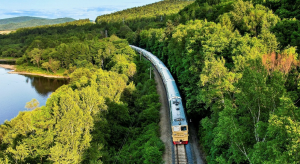Forest train blazes new trail for tourism in northeast China

A newly-launched tourist train offers travelers to northeast China’s Heilongjiang Province a new experience in enjoying the scenery of its signature emerald forests.
Lying back on comfortable seats and taking a sip of freshly-brewed tea, passengers on the 15-carriage train were amazed by the magnificent view of the Lesser Khingan Mountains.
“We can now enjoy the beautiful scenery and attentive service at the same time,” said Zhang Wei, a passenger on the train dubbed “forest capital”.
On June 18, the train started its first trip from the provincial capital of Harbin to the city of Yichun, offering over 200 passengers an eight-hour experience of natural wonders.
The train is decorated with an exterior design featuring red pines, mountain stones and snowflakes, as well as a slogan for the train: “A home heading for the forest”.
“I am quite satisfied with the facilities and services on this train. It is just like a hotel on the tracks!” Zhang added.
ADVERTISEMENT
The train provides passengers with personalized dining, concierge service for each compartment on the sleeper cars, and introductions of scenic spots, said Lin Hongyu, a crew member on the train.
“We hope to create a ‘home away from home’ in the forest for tourists aboard our train,” Lin added.
The “forest capital” is operated with the joint efforts of the Yichun Tourism Development Group, a subsidiary of Heilongjiang Yichun Forest Industry Group Co., Ltd., and the Harbin railway culture and tourism group.
After its Sunday debut, the train is on a trial run, and the plan is to eventually launch three new routes in the eastern, central, and western parts of Heilongjiang to attract more tourists, said the operators.
Wang Rongjiang, assistant to the chairman of Yichun Tourism Development Group, said that the operation of this train will further expand the exchanges and cooperation between Yichun and other cities.
Wang hopes the train will attract more investors to Yichun and generate new momentum for tourism in the Lesser Khingan Mountains region.
“Part of the railway for this train trip has been operating since 1941,” said Wang. “Now the ‘forest capital’ has given it new life.”

